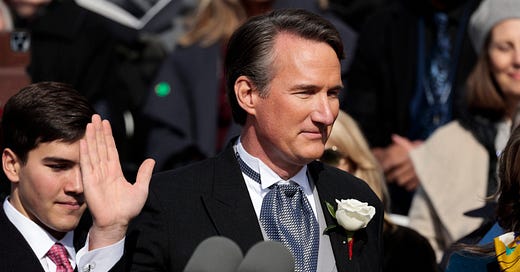
Glenn Youngkin has only been Virginia’s 74th governor for a few days, but he’s working double time to catch up to some of his more seasoned Republican colleagues in terms of months-long legal controversies surrounding COVID-19 protocols.
Gov. Youngkin issued 11 executive orders on day one, ranging from banning Critical Race Theory, to firing the parole board, to ending mandatory mask mandates in schools and vaccination mandates for state employees.
Some of Virginia’s public colleges announced they’d comply with the governor’s order about ending the mandate that state employees be vaccinated.
But some of the state’s largest public school districts demurred on masks. Alexandria, Arlington, Prince William, Richmond, and Fairfax, the largest school system in the Commonwealth, all announced that they plan on continuing a mask mandate.
That’s because the K-12 mask mandate issued by former Gov. Ralph Northam, which has effectively been rescinded, was based on a March 2021 law, SB 1303, which which requires schools to:
provide such in-person instruction in a manner in which it adheres, to the maximum extent practicable, to any currently applicable mitigation strategies for early childhood care and education programs and elementary and secondary schools to reduce the transmission of COVID-19 that have been provided by the federal Centers for Disease Control and Prevention. (Emphasis added.)
The provisions of SB 1303, passed with an overwhelming bipartisan majority, expire in August of this year, meaning that come fall, unless the legislature acts to renew the law, state-wide mandatory masking in schools will come to an end in Virginia.
Youngkin wrote in his order that the masking requirements “inflicted notable harm” and was “proven to be impracticable”; some parents disagreed and have filed suit, asking the courts to block Youngkin’s executive order because they believe it conflicts with the provisions of the 2021 law.
There’s a lot to digest here: Does the CDC “mandate” masks in schools? It does not, but universal masking is the guidance for K-12 schools. And the wording of Virginia’s law is vague. “Applicable,” “manner,” and “maximum extent practicable” are phrases lawyers will have a field day arguing over. The media will love it, too.
Unlike Northam’s executive order, which was consistent with the underlying law, Youngkin’s could conflict with it. But that’s for the courts to decide. The order doesn’t take effect until Monday, January 24th, and when that happens, more lawsuits will likely be filed. Parents in districts that continue to mandate masking will certainly file suits against school districts if their kids are turned away for refusing to mask, and perhaps the state will file suit against them, too. We won’t know until next week and beyond.
And then, there’s the money. In a Fox News appearance, Lt. Governor Winsome Sears suggested that the state might withhold money from districts that didn’t comply, saying: “There’s certain combinations of money that we send to the local schools and he could withhold some of that.”
Perhaps she was talking out of school, as Youngkin’s team responded to Democrat complaints: “Democrats willfully mischaracterized the Lieutenant Governor’s comments to the press and played politics in an effort to delegitimize the rights of parents.” Sears was either freelancing or telegraphing what Youngkin and his team are considering doing. It seems unlikely that any legislative solution has much of a chance in this newly divided government, but it’s not impossible.
Lastly, Virginia’s educational funding is determined mostly by something called the Local Composite Index, which “determines a school division’s ability to pay education costs fundamental to the commonwealth’s Standards of Quality.” It hinges on three factors: the value of real property (property taxes), adjusted gross income, and taxable retail sales. The Virginia Department of Education notes “Each locality’s index is adjusted to maintain an overall statewide local share of 45 percent and an overall state share of 55 percent.”
That’s a lot of money, and it’s unclear how the governor could withhold formulaic funding from local school districts. But if it comes to that, look for even more lawsuits.
It’s impossible to know how fast certain courts will act, but the clock is ticking between now and August, when the underlying law expires. And when it does, depending on the COVID situation this fall, we may see yet more lawsuits about school districts mandating universal masking.




